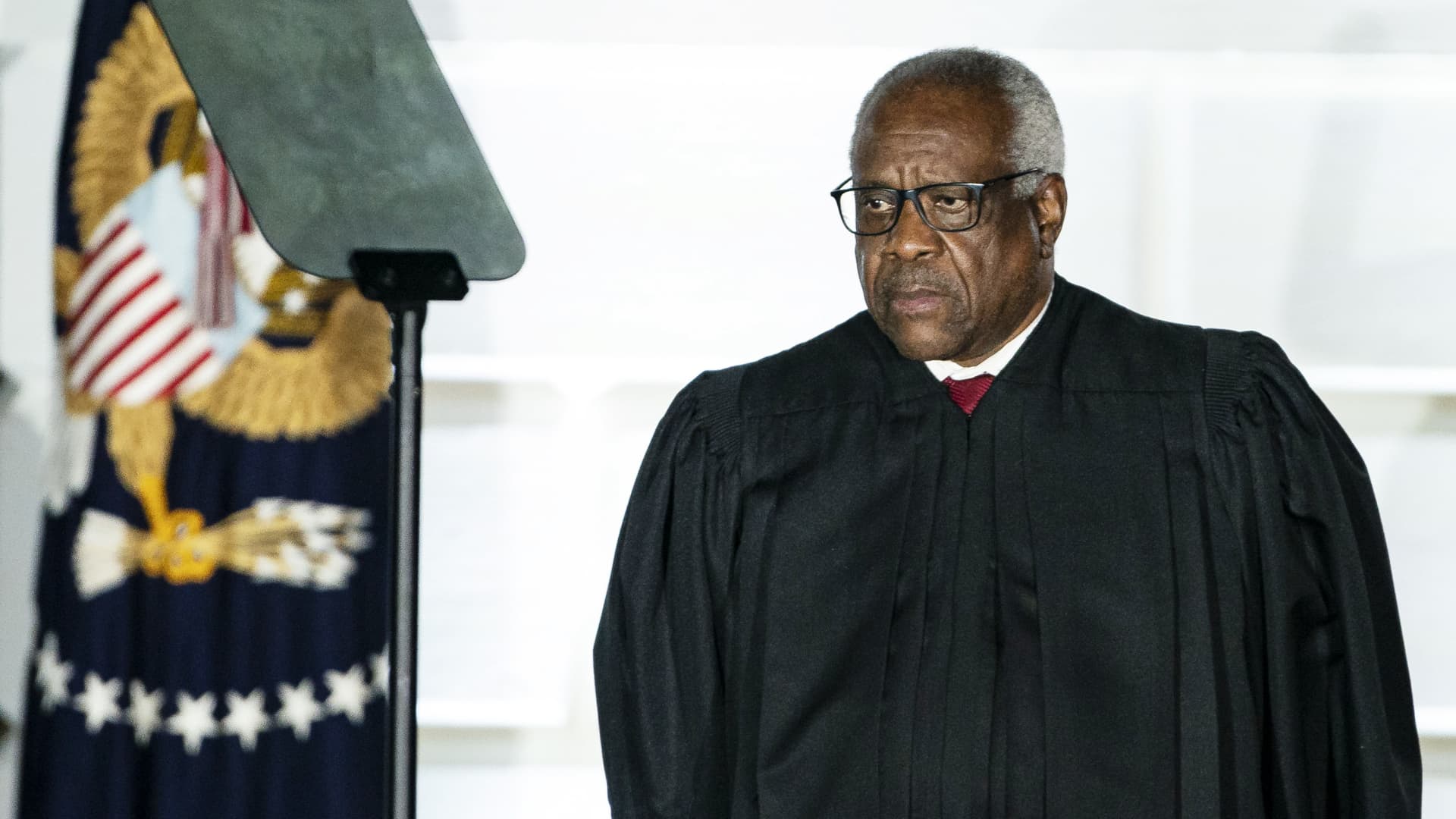
Clarence Thomas, associate justice of the U.S. Supreme Court, listens during a ceremony on the South Lawn of the White House in Washington, D.C., U.S., on Monday, Oct. 26, 2020.
Al Drago | Bloomberg | Getty Images
Supreme Court Justice Clarence Thomas is facing fresh pressure on multiple fronts, following new reporting about his financial history and as House Democrats urge his recusal from the election interference case of former President Donald Trump.
Democrats cited the court’s new code of ethics by pointing to the actions of Thomas’ wife, Ginni Thomas, and her reported efforts to challenge the 2020 election results.
The split-screen scrutiny underscores the unique combination of influence and independence wielded by the powerful conservative justice, the most senior member of the nation’s highest court.
The investigative news outlet ProPublica revealed Monday that Thomas in 2000 told a Republican lawmaker that Congress should raise the salaries of Supreme Court justices.
Thomas, who was hundreds of thousands of dollars in debt at the time, said that “one or more justices will leave soon” if that action was not taken, ProPublica reported.
The congressman, Florida Rep. Cliff Stearns, was reportedly worried by the conversation. “His importance as a conservative was paramount,” Stearns told ProPublica in a recent interview. “We wanted to make sure he felt comfortable in his job and he was being paid properly.”
Stearns later wrote to Thomas that he intended to “look into a bill to raise the salaries of members of The Supreme Court.”
“As we agreed, it is worth a lot to Americans to have the constitution properly interpreted. We must have the proper incentives here, too,” Stearns wrote in the Jan. 11, 2000, letter.
In other private conversations around the same time, Thomas discussed removing a longstanding ban on justices giving paid speeches, ProPublica reported, citing a memo to then-Chief Justice William Rehnquist from a top judiciary official.
The official, L. Ralph Mecham, noted in that memo that the likely “prime beneficiaries” of a plan to raise justices’ pay “who might otherwise leave the Court” are Thomas and Justice Antonin Scalia, another staunch conservative.
Congress ultimately did not lift the speaking fees ban and did not approve a major hike to the justices’ pay. Neither Thomas nor Scalia, who died in 2016, retired from the court.
Thomas’ salary in 2000 was $173,600; an associate justice’s salary in 2023 is $285,400. The latter figure is a lower salary than the one from 2000, when adjusted for inflation.
The Supreme Court did not immediately provide a comment on the article, which follows a spate of other recent reporting by ProPublica and others about Thomas’ financial and ethical history on the bench.
Thomas, nominated to the high court in 1991 by then-President George H.W. Bush, has come under fire for his acceptance of lucrative gifts. Among those are years of luxury trips from Republican megadonor Harlan Crow, which were not reported on Thomas’ financial disclosures.
The Senate Judiciary Committee last month voted to authorize subpoenas for Crow and prominent conservative judicial activist Leonard Leo. Republicans on the Democrat-led panel protested the vote, accusing the majority of playing politics to try to damage the court, which bears a 6-3 conservative majority.
A spokesman for Judiciary Chairman Sen. Dick Durbin of Illinois declined to comment on ProPublica’s latest report.
Recusal request
Meanwhile, a group of eight House Democrats is pushing Thomas to recuse himself from one of the most closely watched matters before the Supreme Court: a bid by special counsel Jack Smith to quickly sink Trump’s claim of “presidential immunity” in his federal election interference case.
The Democrats argued that the involvement of Thomas’ wife, Ginni Thomas, in efforts to challenge the 2020 election results raises “serious questions” about the justice’s ability to “be or even appear impartial” in cases about the election or the Jan. 6, 2021, insurrection.
“We strongly implore you to exercise your discretion and recuse yourself from this and any other decisions” in Trump’s case, the Democrats wrote in a letter to Thomas.
Smith’s office is prosecuting Trump in Washington, D.C., federal court on charges of conspiring to overturn his 2020 loss to President Joe Biden.
Trump, who has pleaded not guilty, appealed a U.S. district judge’s recent ruling denying his claim that he is immune from criminal prosecution for most actions taken while he was president.
Rather than allow the appeal to work its way through the D.C. Circuit Court of Appeals — and then likely be appealed again to the Supreme Court — Smith on Dec. 11 asked the high court to take up the case.
“It is of imperative public importance that respondent’s claims of immunity be resolved by this Court and that respondent’s trial proceed as promptly as possible if his claim of immunity is rejected,” Smith wrote.
Trump is due to file a response to Smith’s petition by Wednesday.
The Democrats’ letter, led by Rep. Hank Johnson of Georgia and dated Friday, points to the new code of conduct signed by the justices last month.
The code advises a justice to “disqualify himself or herself in a proceeding in which the Justice’s impartiality might reasonably be questioned.”
Ginni Thomas was “intimately involved in Mr. Trump’s alleged efforts to overturn the 2020 election and to obstruct its certification — the very conspiracies at issue in this case,” the Democrats wrote.
They cited reporting that Ginni Thomas sent texts urging Trump’s then-chief of staff Mark Meadows to work to overturn Biden’s victory, and expressed similar sentiments to key state legislators.
Thomas has given no indication that he plans to recuse himself from Trump’s case.
The court, facing criticism and low public approval, said it issued the code in order to “dispel” any “misunderstanding” that the court’s nine justices are unbound to ethics rules.
Some critics quickly panned the code over its lack of any enforcement mechanism or outside authority.
